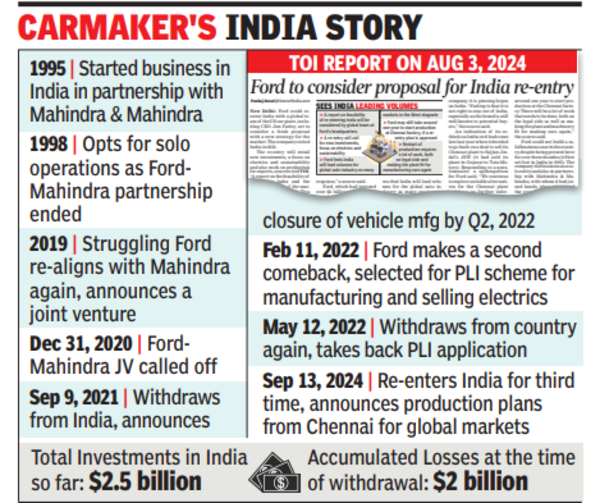NEW DELHI/CHENNAI: After withdrawing twice,
Ford Motor Co is betting on India
for a third time.
Ford
said on Friday that it plans to restart work at the
Chennai plant
to make cars that are initially aimed for exports. The company’s statement did not divulge any immediate plans for the domestic market, though it seen as a key reason behind the decision to come back again.
Ford had refused to sell The Chennai factory to Sajjan Jindal’s JSW group, despite advanced negotiations
“Ford today announced that it has submitted a letter of intent to the govt of Tamil Nadu, confirming its intention to utilise the Chennai plant for manufacturing for exports. The announcement follows a meeting between Ford leadership and the chief minister of Tamil Nadu as part of his visit to the US,” the company’s statement said.
TOI was the first to report on Ford’s impending entry to India in its edition dated August 3 this year.
“We are grateful for ongoing support from the Tamil Nadu govt as we explored different options for the Chennai plant,” said Kay Hart, president, Ford International Markets Group. “This step aims to underscore our ongoing commitment to India as we intend to leverage the manufacturing expertise available in Tamil Nadu to serve new global markets,” the company said, adding that further information about the type of manufacturing and other details will be disclosed in “due course”.
Ford, which had invested over $2.5 billion in India and tasted success with products such as
Eco Sport
mini-SUV and Figo small car before quitting, now believes that Indian market and manufacturing here will help it navigate global business as many markets in the West stagnate. Also, with China and Europe not being significant businesses for the company, India is where it is pinning its hopes on. “Increasingly, the feeling is that it is not right to stay out of India, especially as the brand is still well-known to potential buyers,” a source said.
Ford could not build a solid business case in the country, despite being present here for over three decades (it first entered in 1995). The company did business as a solo entity, and also in partnership with Mahindra & Mahindra. However, the JVs failed to work on two occasions.
Having failed to make any impact alone, the company had first announced its exit in September 2021, before making a re-entry in February 2022 when it bagged benefits under the
production-linked incentive
(PLI) scheme for EVs. However, it soon announced a withdrawal in May 2022, possibly finding it more viable to sell the factories than running a loss-making business.


